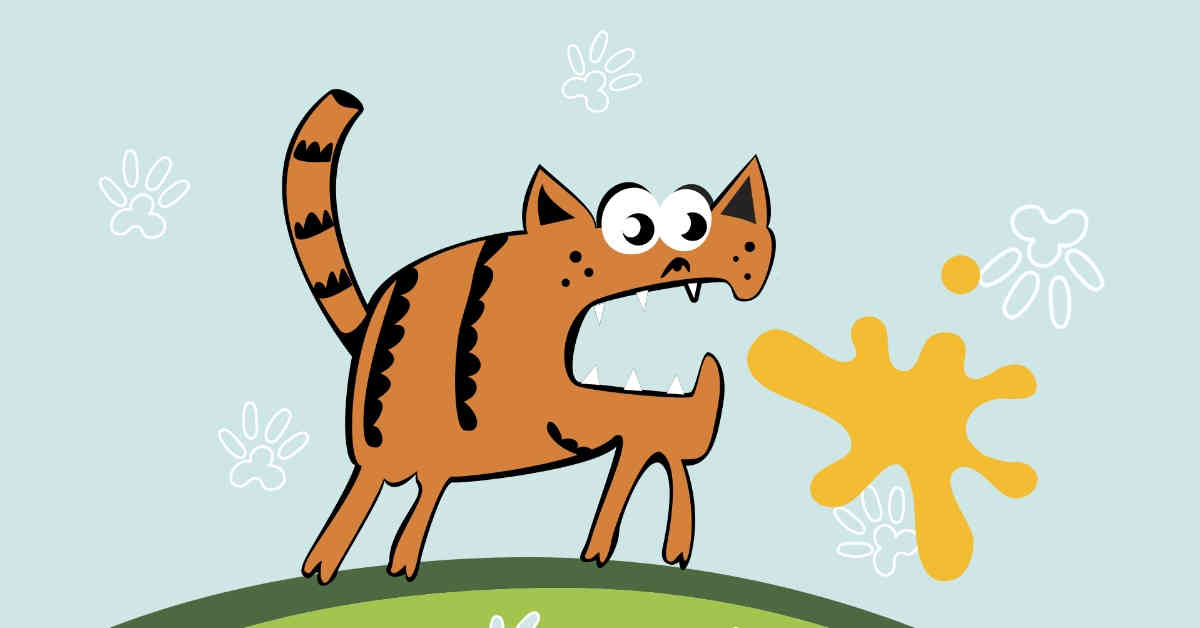Updated July 25, 2021
Vomiting can be a symptom of a wide variety of illnesses in cats, many of which are featured in this article. Vomiting can also be normal, so let’s start by deciding when to go to the vet.
How To Tell If Vomiting Is Abnormal
A ‘normal’ vomit should be quick, happen once only and not be accompanied by a loss of appetite. A good rule of thumb is that if a cat vomits once a week or more, you should get them checked by a vet.
Other important reasons to visit the vet are:
- weight loss
- a poor appetite
- blood in the vomit
- being under one or over ten years old
- having other symptoms such as diarrhoea or lethargy
Causes Of Vomiting In Cats
The causes of vomiting in cats range from simple things like hairballs, food intolerances or eating too fast to serious illnesses like kidney disease and cancer. Your vet should be able to tell if the problem is serious or not.
Hairballs
Hairballs are not as common a cause of vomiting as most cat owners think. Cats swallow hair every time they groom and often carry harmless hairballs in their stomach. Then they vomit, and hey presto: the hairball gets blamed.
Though rare, hairball problems requiring surgery do sometimes occur in long-haired breeds. For short-haired cats, a hairball should only cause a very occasional single vomit. The cat should be otherwise perfectly happy, healthy and have a good appetite.
Read more about the treatment and prevention of hairballs here.
Over-Eating & Rapid Eating
Vomiting is more common when cats are given free access to large meals. It’s just that some cats aren’t very good at eating slowly or stopping at the right time. This is especially true for dry foods, that start to swell once they moisten in the stomach.

Rapid eating is also a problem in cats who feel like they have to compete for food. The result in both cases is usually a firm cylinder of vomited food that doesn’t look like it’s been digested at all. Usually it comes up shortly after eating.
For all cats, stopping dry foods may be needed, but it’s better to use a food dispenser or teach your cat to accept small regular meals. Prevention in multiple cat households should start by allowing them to eat their dinners separately.
Food Intolerances
Just like people, cats can be intolerant of certain foods. Like in the previous example, they should be otherwise normal in health. However, as adverse food reactions are not all that common, it’s important to rule out the more serious reasons for vomiting first.
Once that’s done, you can visit this page on restricted and elimination diets for adverse food reactions.
Gastritis & Gastroenteritis

Cats aren’t as silly as dogs. However, even they will sometimes eat something they shouldn’t. Many of these cats need treatment but should make a full recovery. We almost never identify the cause.
Cats with outside access get more of these stomach upsets, probably due to infections from birds, reptiles or rodents they eat.
Foreign Bodies

Even sillier cats, and especially kittens, sometimes eat foreign material. One cat started vomiting after eating the string that wraps meat, whereas others have eaten cooked bones, fish hooks, toys and even babies’ teats.
The worst cases come from swallowing string, which is why we never advise playing with it. It gets caught on their rough tongue and they seem to almost swallow it by accident.
Worms
Parasites are probably an unusual cause of vomiting, although we can’t be certain. Just to be sure, I always worm cats that vomit frequently.
To illustrate just how vague a symptom it is in cats, vomiting is also one of the signs of feline heartworm. That’s thankfully quite rare these days.
Medications
Nearly all medicines can cause vomiting, so if your cat takes something please make sure you tell your vet. Particularly common culprits are treatments for feline arthritis and hyperthyroidism.
Viruses
Many viral infections sometimes have vomiting as part of their symptoms. These include feline infectious peritonitis (FIP), feline panleucopaenia (also called feline enteritis or parvovirus) and feline leukaemia virus (FeLV).
The last two have effective vaccinations. In Adelaide cats certainly need the feline enteritis vaccination but we don’t have much leukaemia virus to worry about.
Vomiting In Older Cats
There are special reasons why a mature cat might vomit that are rare in young cats. Here are the most common.
Constipation
Vomiting in an older cat can have any number of explanations but in my clinic, the number one cause is constipation. These cats usually look and act well, but are vomiting a little more often and may have lost some weight.
These are the same symptoms as the next five causes so please don’t treat your cat for constipation without seeing the vet first. Once it’s confirmed, visit our page on the treatment of constipation in cats.
The next five are all diagnosed or excluded by routine wellness blood testing.
Hyperthyroidism
Cats with excessive thyroid hormone levels commonly have a ravenous appetite. A bit like the rapid eaters and over-eaters I mentioned earlier, this can lead to vomiting after meals. Visit this page for more on thyroid problems in cats.
Chronic Kidney Disease
Kidney problems are always high on our suspicions if an older cat is vomiting but drinking more. Other signs are a reduced appetite and weight loss.
Visit here for diagnosis, staging and treatment of feline kidney failure.
Pancreatitis
There is no doubt that we are still missing some cats with pancreatitis despite having a new test. The good news is that we’re much more aware of it than we used to be, and treatment is generally successful.
Liver disease
Cats get a range of liver diseases, but especially cholangiohepatitis. It requires a biopsy to diagnose but is then usually easy to manage.
Diabetes
Diabetes in cats is another common disease, especially of the overweight and middle-aged. It’s not at all a death sentence with modern insulin choices like glargine.
IBD
What we call IBD or inflammatory bowel disease is really a very poorly understood chronic problem. It causes vomiting, diarrhoea and weight loss over many months. Intestinal biopsies are essential for its diagnosis. Read more about IBD in cats here.
Neoplasia
The most common cancer of the gut in cats is small cell lymphoma. It looks exactly the same as IBD until biopsies are done, but is quite treatable once diagnosed.
Many other tumours and cancers can affect the gut of older cats just like many other species. Most can be removed if diagnosed via ultrasound in time.
Related: Causes of vomiting in dogs.
Have something to add? Comments (if open) will appear within 24 hours.
By Andrew Spanner BVSc(Hons) MVetStud, a vet in Adelaide, Australia. Meet his team here. The information provided here is not intended to be used as a substitute for going to the vet. If your pet is unwell, please seek veterinary attention.


My Kitten is puking Foamy green puke and he’s not moving or eating and I’m very worried about him
Hi Chris. I know this is fairly obvious, but you need to see a vet straight away.